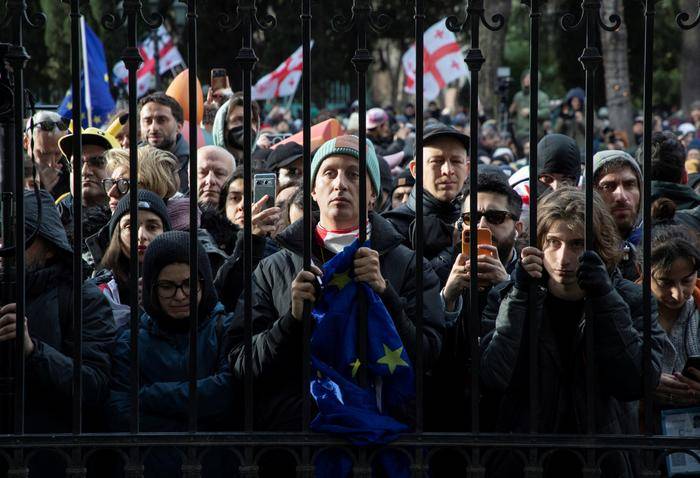Georgia's Democratic Backsliding: Government Crackdown on Opposition and Civil Society Sparks Concerns
The Georgian government's recent actions have raised concerns about the country's democratic trajectory. In a worrying trend, the ruling party has been accused of stepping up repression against the opposition and civil society, sparking fears of democratic backsliding.
The latest developments have seen the government launch a series of investigations and arrests targeting opposition politicians, activists, and journalists. The moves have been widely condemned by local and international human rights groups, who argue that they are part of a broader effort to silence dissenting voices and consolidate power.
One of the most high-profile cases involves the arrest of Nika Melia, the chairman of the opposition United National Movement (UNM) party. Melia was detained on charges of organizing mass unrest during a protest rally in June 2019. The opposition has denounced the arrest as politically motivated, arguing that it is part of a broader effort to discredit and intimidate opposition leaders.
Other opposition politicians have also faced harassment and intimidation. Gigi Ugulava, a prominent opposition figure, was recently summoned for questioning by the prosecutor's office. Ugulava has been a vocal critic of the government's handling of the economy and has accused the ruling party of corruption.
The government's crackdown has not been limited to opposition politicians. Civil society organizations and independent media outlets have also faced pressure and intimidation. The government has introduced a series of laws and regulations that critics argue are designed to stifle dissent and limit freedom of expression.
One of the most contentious laws is the so-called "foreign agent" law, which requires non-governmental organizations (NGOs) that receive foreign funding to register as "foreign agents." Critics argue that the law is designed to discredit and intimidate NGOs that are critical of the government.
The Georgian government's actions have sparked concerns internationally. The European Union and the United States have both expressed concerns about the government's handling of the opposition and civil society.
In a statement, the EU's High Representative for Foreign Affairs and Security Policy, Josep Borrell, expressed concern about the "increasingly difficult environment" for opposition politicians and civil society in Georgia. Borrell called on the Georgian government to respect the rights of all citizens, including those of opposition politicians and civil society activists.
The government's actions have also had significant domestic consequences. The crackdown on the opposition and civil society has sparked widespread protests and demonstrations. Thousands of people have taken to the streets to demand greater freedoms and an end to the government's repression.
The opposition has also vowed to continue its fight against the government's authoritarian tendencies. In a statement, the UNM party said that it would "continue to fight for democracy and freedom" in Georgia, despite the government's efforts to silence it.
The Georgian government's crackdown on the opposition and civil society has sparked significant concerns about the country's democratic trajectory. The government's actions have been widely condemned by local and international human rights groups, and have sparked widespread protests and demonstrations.
As the situation continues to unfold, it remains to be seen how the government will respond to the growing criticism. One thing is clear, however: the Georgian government's actions have significant implications for the country's democratic future.




No comments yet
Be the first to share your thoughts!